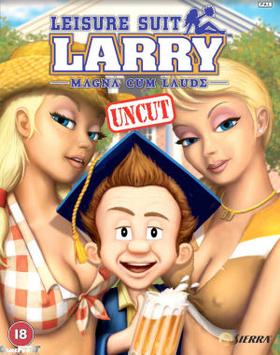
Leisure Suit Larry is an adult-themed sex comedy video game series created by Al Lowe. Drawing inspiration from Softporn Adventure, the Leisure Suit Larry series centers on Larry Laffer—a middle-aged man known for his balding head, penchant for double entendre, and iconic leisure suits. The stories typically focus on his unsuccessful attempts to seduce young women, portraying him as an unsuccessful pickup artist. A common link between the games are Larry's explorations of luxurious and cosmopolitan hotels, ships, beaches, resorts, and casinos.

Slapping and popping are ways to produce percussive sounds on a stringed instrument. They are primarily used on the double bass or bass guitar. Slapping on bass guitar involves using the edge of one's knuckle, where it is particularly bony, to quickly strike the string against the fretboard. On bass guitars, this is commonly done with the thumb, while on double bass, the edge of the hand or index finger may be used. Popping refers to pulling the string away from the fretboard and quickly releasing it so it snaps back against the fretboard. On bass guitar, the two techniques are commonly used together in alternation, though either may be used separately.

Diver communications are the methods used by divers to communicate with each other or with surface members of the dive team. In professional diving, diver communication is usually between a single working diver and the diving supervisor at the surface control point. This is considered important both for managing the diving work, and as a safety measure for monitoring the condition of the diver. The traditional method of communication was by line signals, but this has been superseded by voice communication, and line signals are now used in emergencies when voice communications have failed. Surface supplied divers often carry a closed circuit video camera on the helmet which allows the surface team to see what the diver is doing and to be involved in inspection tasks. This can also be used to transmit hand signals to the surface if voice communications fails. Underwater slates may be used to write text messages which can be shown to other divers, and there are some dive computers which allow a limited number of pre-programmed text messages to be sent through-water to other divers or surface personnel with compatible equipment.

A strike is a directed, forceful physical attack with either a part of the human body or with a handheld object, intended to cause blunt or penetrating trauma upon an opponent.

Hand games are games played using only the hands of the players. Hand games exist in a variety of cultures internationally, and are of interest to academic studies in ethnomusicology and music education. Hand games are used to teach music literacy skills and socio-emotional learning in elementary music classrooms internationally.

The push-up is a common calisthenics exercise beginning from the prone position. By raising and lowering the body using the arms, push-ups exercise the pectoral muscles, triceps, and anterior deltoids, with ancillary benefits to the rest of the deltoids, serratus anterior, coracobrachialis and the midsection as a whole. Push-ups are a basic exercise used in civilian athletic training or physical education and commonly in military physical training. They are also a common form of punishment used in the military, school sport, and some martial arts disciplines to humiliate and its absence of use for equipment. Variations of push-ups, such as wide-arm push-ups, diamond push-ups target specific muscle groups and provide further challenges.

Tsuki (突き) derives from the verb tsuku (突く), meaning "to thrust". The second syllable is accented, with Japanese's unvoiced vowels making it pronounced almost like "ski". In Japanese martial arts and Okinawan martial arts, tsuki is used to refer to various thrusting techniques.
Strikes can be offensive moves in professional wrestling, that can sometimes be used to set up an opponent for a hold or for a throw. There are a wide variety of strikes in pro wrestling, and many are known by several different names. Professional wrestlers frequently give their finishers new names. Occasionally, these names become popular and are used regardless of the wrestler performing the technique.

The high five is a hand gesture whereby two people simultaneously raise one hand and slap the flat of their palm against the other. The gesture is often preceded verbally by a phrase like "Give me five", "High five", or "Up top". Its meaning varies with the context of use but can include as a greeting, congratulations, or celebration.

A boxer's fracture is the break of the fifth metacarpal bone of the hand near the knuckle. Occasionally, it is used to refer to fractures of the fourth metacarpal as well. Symptoms include pain and a depressed knuckle.
"Leopard Blow," "leopard punch," and "leopard fist" are common terms for a specific type of striking blow, associated primarily with the Leopard Kung Fu substyle of the Five Animals in Chinese martial arts, though it is also used in styles such as Krav Maga, Choy Li Fut and Karate. The maneuver involves folding the first two joints of the fingers inward and striking with the fore-knuckles. It is used most often to strike at soft, vulnerable targets, such as the ribs, throat, inner arms and temples.
Subak (手搏) is an ancient martial art that originated in Korea and uses bare-hand techniques. The term was also used in Korea to refer to any fighting style that used bare hands. It is a different fighting style from Soo Bahk Do, which is a modern martial art with the same pronunciation.

Leisure Suit Larry: Magna Cum Laude is a 2004 adventure video game developed by High Voltage Software and published by Vivendi Universal Games and their subsidiary Sierra Entertainment. It is the seventh main installment in the Leisure Suit Larry series and the first game in the series without any involvement with series creator Al Lowe and the final game to be released by Sierra before the rights were sold to Codemasters following its parent company Vivendi Games' merger with Activision to form Activision Blizzard. The game introduces a new main character, Larry Lovage, as Larry Laffer's nephew.
Mercy is a game of strength, skill, endurance, and pain tolerance popular in Britain, Canada, Pakistan, India, the United States, and elsewhere. The game is played by two players who grasp each other's hands. The aim is to twist the opponent's hands or bend their fingers until the opponent surrenders.
Marcus Lashaun Mann is an American former college basketball player who attended Mississippi Valley State University. He became a Southern Baptist minister.

Egyptian Ratscrew (ERS), also known as Slap, is a modern American card game in the matching family, popular among children. It resembles the 19th-century British card game Beggar-my-neighbour, but includes the additional element of "slapping" certain card combinations when they are played. This slapping concept may have been borrowed from the game Slapjack.

Bloody knuckles is a game in which each player makes a fist with the thumb wrapped around the other fingers. Then each fist punches the other's fist. Players who flinch are out of the game. Whoever lasts the longest before quitting wins the game. The game is played until someone's knuckles are bleeding or they quit due to excessive pain. Variations include simultaneous or alternate punching, and games in which the strike is the loser's punishment/winner's privilege. In the first two ways of playing the game, violence, though essentially consensual, is inherent, not a risk. Almost all ways of playing are dangerous, carrying the risk of injury, scarring, and damage to one's bones and hand. The point is to make them bleed.
The rules of this game are simple: each combatant makes a fist and then the fists punch each other. You flinch, you lose. Whoever lasts the longest before quitting wins.











